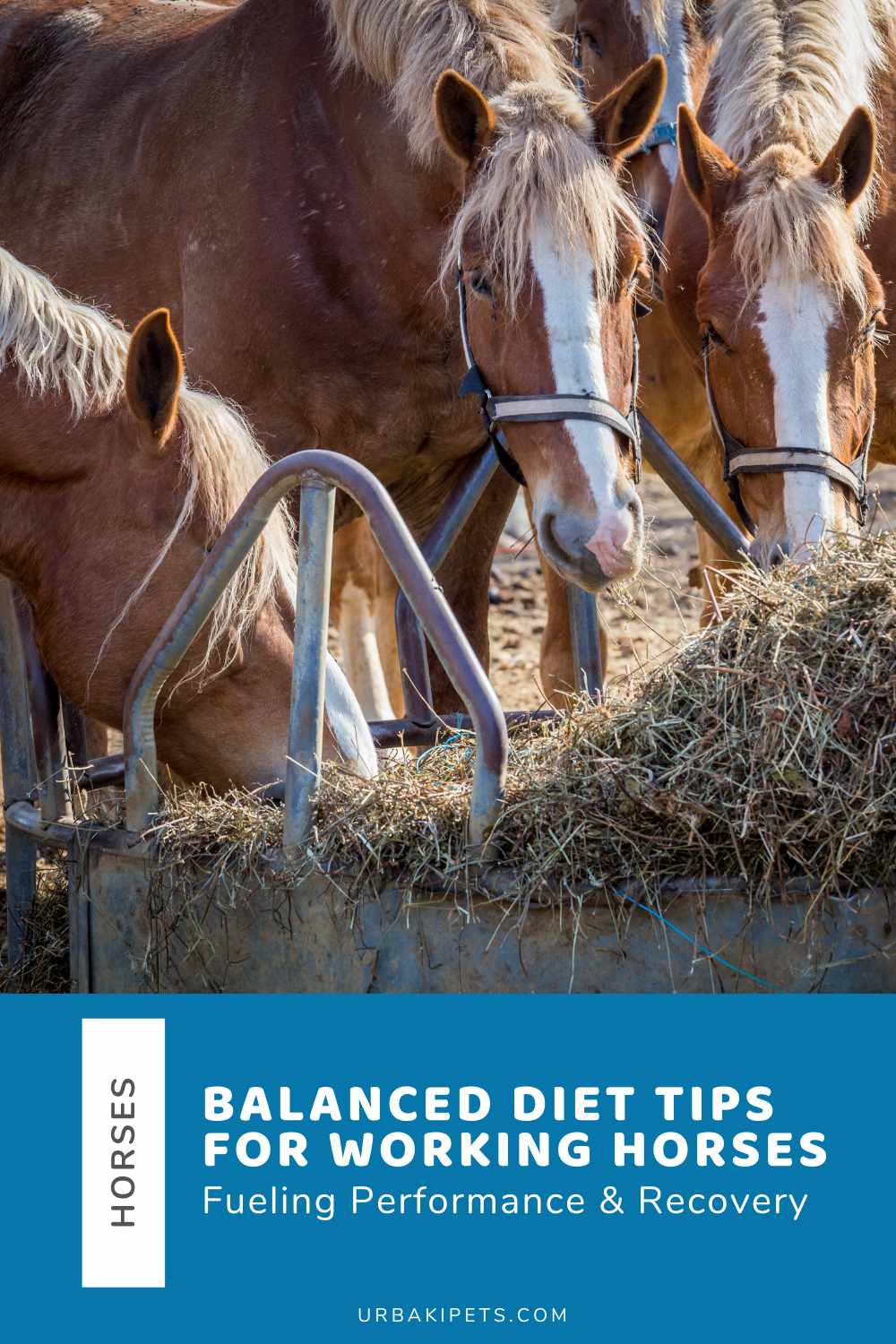Balanced Diet Tips for Working Horses - Fueling Performance and Recovery

Working horses give their best in demanding roles—whether on trails, in arenas, on farms, or in competitions.
To sustain their energy, support recovery, and keep them feeling their best, their diet must be carefully managed.
A well-balanced feeding program is one of the most important tools to maintain both short-term performance and long-term health.
Understanding the Energy Demands of Working Horses
The energy needs of a working horse go well beyond those of a pasture companion. Depending on the workload, breed, age, and individual metabolism, horses in training or labor may burn through calories faster and require more nutrient-dense fuel.
The goal isn’t just to keep them going—it’s to provide the right kind of energy that supports endurance, focus, and physical resilience.
Carbohydrates and fats are both energy sources, but they function differently. High-starch feeds give quick bursts, while fat sources like stabilized rice bran or vegetable oil offer sustained energy.
Balancing these components is key to avoiding digestive upset while meeting workload demands.

The Role of Forage in the Diet
Even high-performing horses need a foundation of quality forage. Hay or pasture provides essential fiber, encourages healthy digestion, and prevents ulcers. A horse should eat 1.5% to 2.5% of its body weight in forage daily.
Skimping on this can lead to behavioral issues, colic, or weight loss—even if concentrates are being fed.
Not all forage is created equal. Choose hay with consistent quality, low dust, and suitable protein levels for the horse’s work level.
In some cases, adding alfalfa or soaked hay cubes can boost both energy and palatability.
Choosing the Right Concentrates
When forage alone isn’t enough to meet energy needs, concentrates can be added. Commercial performance feeds are formulated with the working horse in mind, often providing a balanced mix of vitamins, minerals, protein, and fat.
Always introduce these gradually and match them to your horse’s activity level to avoid overfeeding or under-supplying key nutrients.
Look for feeds with added fat for stamina and protein sources that support muscle development and repair.
Be cautious with sugary or high-starch feeds, especially in horses prone to metabolic issues. Consistent mealtimes, along with proper portioning, help reduce the risk of digestive imbalances.
Supporting Hydration and Electrolyte Balance
Horses lose large amounts of fluids and electrolytes through sweat, especially during intense work or hot weather. Dehydration can lead to fatigue, reduced performance, and in severe cases, colic or heat stress.
Make sure fresh, clean water is always available and monitor intake, particularly after exercise or travel.
Supplementing with electrolytes can help replenish lost sodium, potassium, and chloride. These are often added to the feed or water, especially during competitions or long training sessions.
Some horses may benefit from soaked feeds or mashes to increase moisture intake.

Timing Meals Around Work Sessions
Feeding timing plays a role in both performance and digestion. It’s best to avoid large grain meals right before heavy work, as digestion competes with the muscles for blood flow.
Instead, give forage an hour or two before riding and save grain for afterward, when the body is more prepared to process it.
After exercise, allow your horse to cool down before offering feed. Post-work meals that include some added fat or protein can support muscle recovery and replenish glycogen stores, particularly in horses doing frequent or strenuous work.
Adjusting Diets Based on Workload
A feeding program for working horses isn’t static. It should shift as the horse’s training schedule changes. During peak competition seasons or labor-intensive weeks, energy intake may need a boost.
In quieter periods, overfeeding can lead to weight gain or behavioral changes.
Regular body condition scoring and weight monitoring are important tools. If your horse starts to lose condition or seems sluggish, it may be time to reassess the balance of forage, concentrates, and supplements.
Consulting with an equine nutritionist or veterinarian can provide valuable insights.
Recognizing the Signs of Nutritional Gaps
Even the best diets sometimes miss the mark. Common signs of deficiencies include dull coats, low energy, slow recovery, or changes in behavior.
Over-supplementing can also cause issues, such as loose manure or imbalances in calcium and phosphorus.
Pay attention to how your horse looks and feels.
Are muscles developing evenly? Does your horse recover quickly after work? A responsive, well-fed horse will show vitality, strength, and a willingness to work. If these elements start to fade, nutrition is often the first place to investigate.

The Importance of Routine and Consistency
Consistency is crucial for working horses. Their digestive systems function best with a regular feeding schedule and minimal changes. Introduce new feeds gradually over 7 to 10 days, and avoid abrupt changes in hay or concentrate type.
Even travel or weather shifts can affect appetite, so having a backup plan or a familiar food on hand during travel helps prevent disruptions.
Stick to predictable mealtimes, maintain clean feeding areas, and monitor feed consumption daily. Horses that begin to pick at meals or show signs of stress may be reacting to an unbalanced or uncomfortable diet.
Using Supplements Wisely
Supplements can enhance a balanced diet, but shouldn’t replace it. Common additions for working horses include joint support blends, hoof health formulas, and muscle recovery aids.
Choose supplements with proven ingredients and avoid overlap between products, which can lead to excesses.
When in doubt, less is often more. Keep records of what your horse is receiving, and review the entire feeding program regularly to ensure it's still appropriate.
Performance needs evolve, and the diet should evolve along with them.
Did you find this post useful or inspiring? Save THIS PIN to your PETS Board on Pinterest!


You may also like